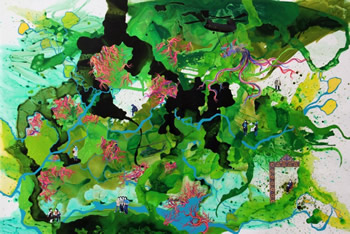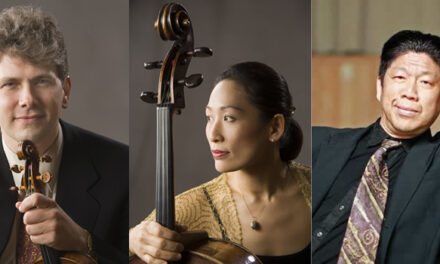We can hardly say enough good things about the collaboration between Peace College and the North Carolina Symphony. Innovative programming, new featured local artists – and it’s free! Over the years, the series has also revealed the depth in technique and musicianship of the NCS bench, first chair players and their section mates. Monday evening’s concert exemplified the point. On the program were three seldom – we mean really seldom – heard works featuring five NCS players, some of whom were unfamiliar to the chamber music audience here.
Reinhold Glière (1875-1956), whose name suggests German or French nationality, was actually Russian. Whatever history’s final judgment on the merits of his art, he earned a place in music’s Hall of Fame for one unique achievement: he was able to please Tsar and Commissar equally and without interruption for some three quarters of a century. Unlike his colleagues, Prokofiev and Shostakovich, Glière was so firmly grounded in the nineteenth century that he never ran afoul of the Soviet aesthetic establishment. Of course, this fact could explain why his music rarely achieves much playtime even on easy listening classical radio. Nonetheless, composer, arranger and bassist Frank Proto, formerly of the Cincinnati Symphony, transformed Glière’s Suite for Violin and Cello, Op. 39, into the Suite for Violin and Double Bass, thereby adding new interest to an otherwise lightweight work. There is precious little repertory for the bass, either as soloist or in chamber ensembles (more on that later), so it was a treat to hear NCS principal bass player, Leonid Finkelshteyn strut his stuff with assistant principal second violinist Jacqueline Saed Wolborsky. Given the unlikelihood that the duo would ever play together again, they sneaked in an encore, Paul Nero’s jazzy tour de force Pizzi-Cats. The two works aptly demonstrated virtuosic bowing for the bass and pizzicato for the violin.
One of the problems with contemporary music is that audiences in the same locale seldom get an opportunity to hear a new work more than once. It was, therefore, gratifying to hear again Robert Ward’s Trio For Clarinet, Cello and Piano, Echoes of America, commissioned in 1997 by the Raleigh Chamber Music Guild in honor of the composer’s 80th birthday. Now, as Ward turns 90, clarinetist Jimmy Gilmore, cellist Elizabeth Beilman and pianist Milton Rubén Laufer revisited the piece. Ward himself introduced the work, which incorporates the signal musical sonorities – classical, popular and jazz – of his eight decades before the premiere. Gilmore, who also premiered the piece, had suggested the title. Echoes is a work of grand proportions, whose subtle integration of so many musical traditions gives it a breadth of both style and feeling.
Violist Paul Malcolm joined his aforementioned string colleagues and pianist Laufer for the final work on the program, which was new to us – and to just about everyone else in the audience: the Piano Quintet in c minor for Violin, Viola, Cello, Double Bass and Piano by Ralph Vaughan Williams. Although Vaughan Williams composed the work in 1903 (revising it in 1905), he stipulated in his will that it never be published. After much wheedling of the composer’s heirs – akin to the hectoring endured by Alban Berg’s widow over the conclusion to the opera Lulu – the score was finally published nearly a century after its composition, in 2002.
The Quintet is a lush, Romantic work, composed before VW had internalized his signature British/folk voice. One of the most interesting features of the work was its timbre, analogous to gourmet dark chocolate, with the double bass as equal partner in the voicing and the viola taking the place of a second violin. Like any new work, it will take some rehearing to evaluate it. After all, as Laufer quipped from the stage, it post-dates Ward’s trio.
All three – sorry – four works on the program were expertly played. Wolborsky, in particular, demonstrated that outside the orchestra she need play second fiddle to nobody.













